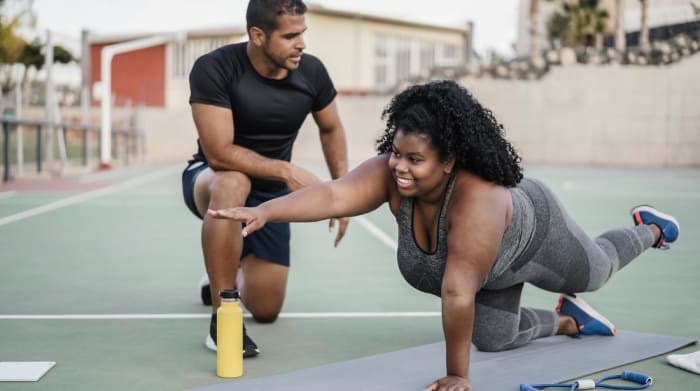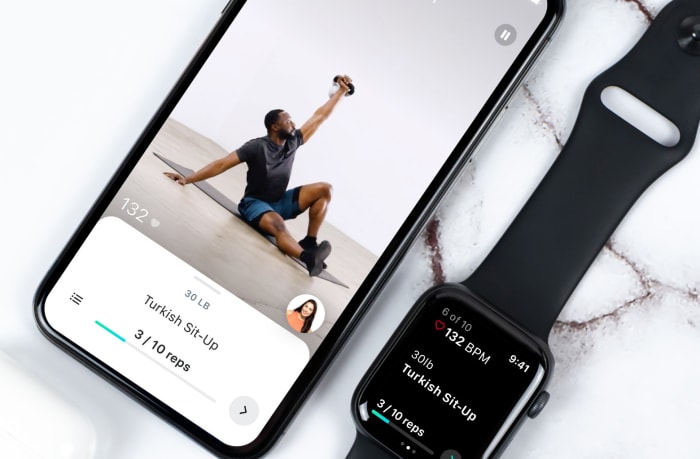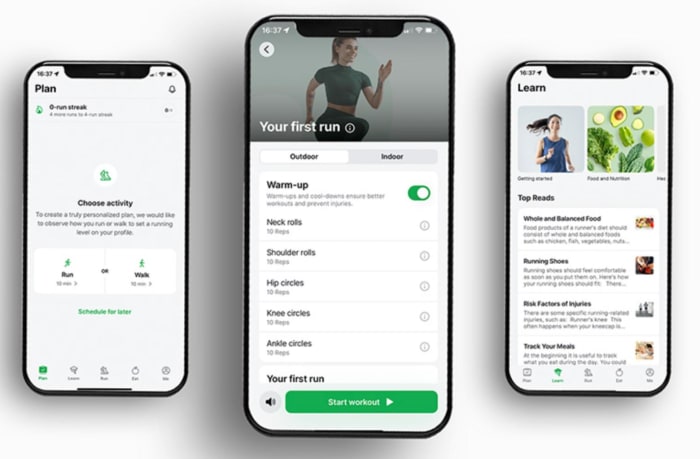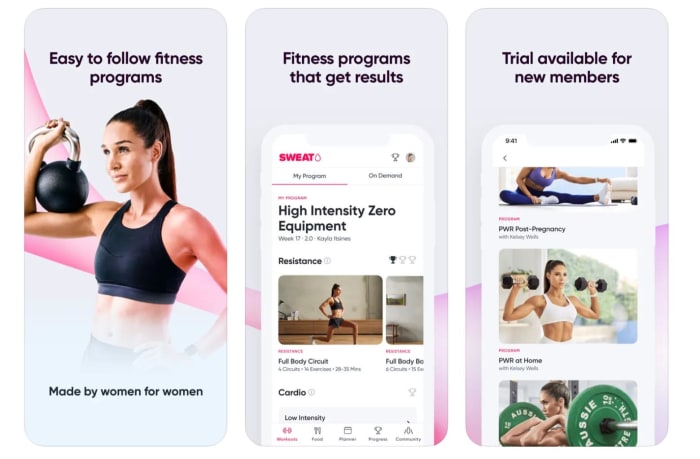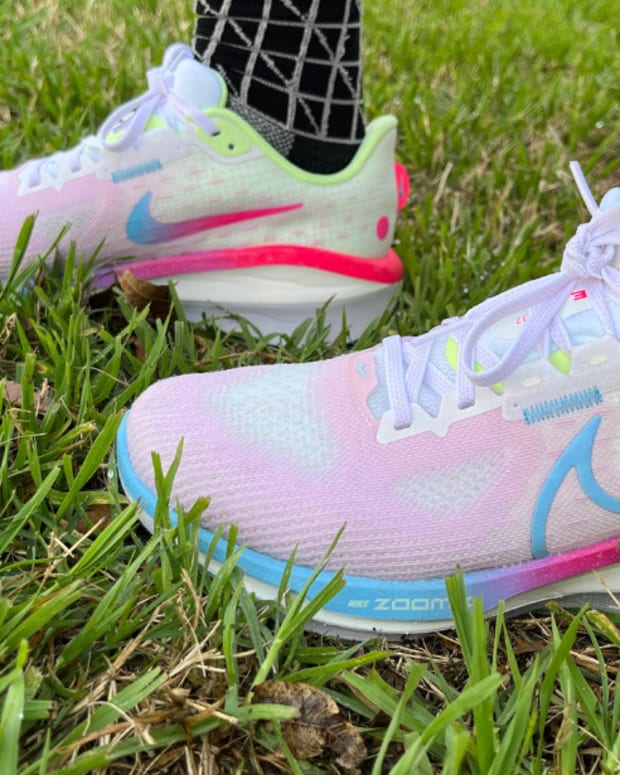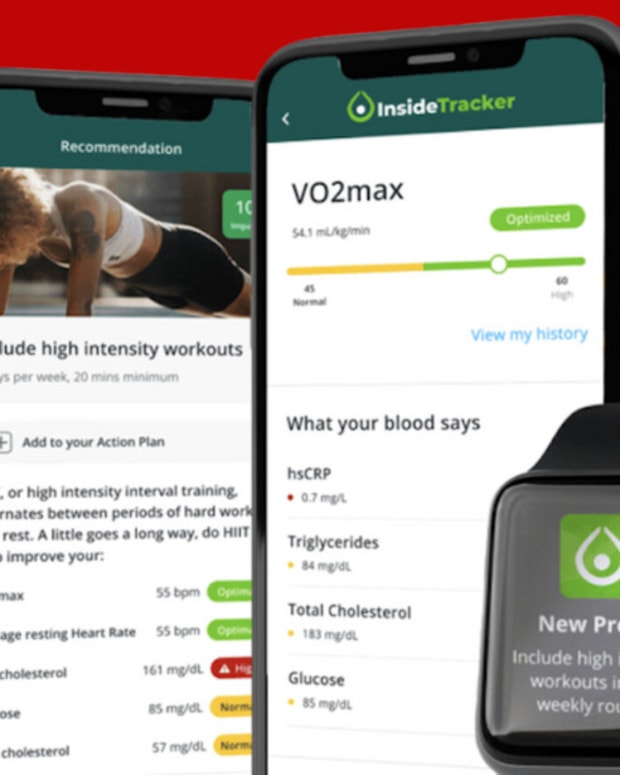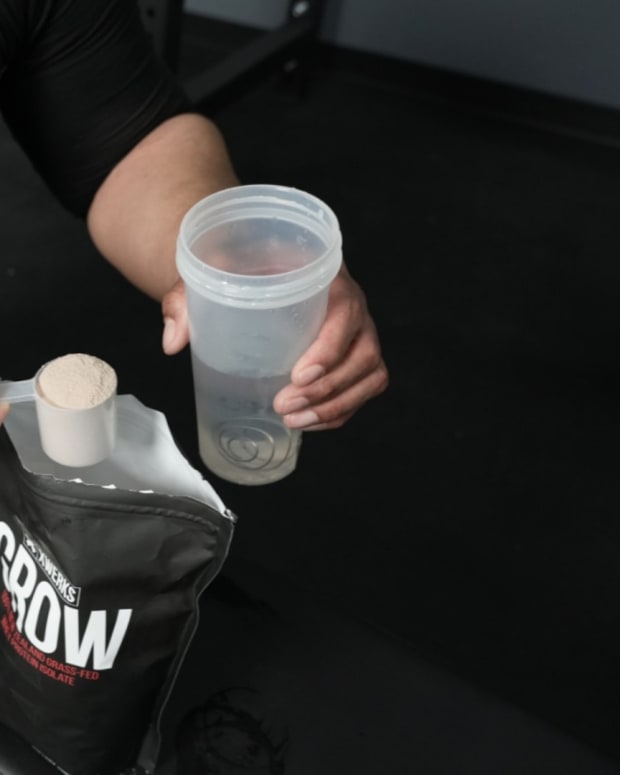The products featured in this article have been independently reviewed. When you buy something through the retail links on this page, we may earn commission at no cost to you, the reader. Sports Illustrated editorial staff are not involved in the creation of this content. Learn more here.
When embarking on your personal fitness journey, enlisting the expertise of a certified personal trainer can be instrumental in helping you effectively and safely achieve your health and fitness goals. A dedicated fitness professional can provide personalized guidance, motivation and workout routines tailored to your specific needs which will allow you to maximize your full potential. With so many different options available, it’s essential to find a trainer who aligns with your personal preferences and fitness aspirations. This will help to ensure your personalized training is both a successful and enjoyable experience.
In this article, we will explore the main reasons for hiring a certified personal trainer, what to consider when choosing the right trainer for you and the best ways to find fitness professionals in your area. We also cover specific topics such as the cost of personal training, whether personal training can help with weight loss and if personal trainers are actually worth the time and financial investment. We hope this article is your first step on the path to success in all of your fitness endeavors.
Why Hire A Personal Trainer
Guidance and safety
Quality personal trainers possess the knowledge and expertise needed to create personalized workout programs based on your current fitness level, specific goals and any limitations or injuries you may have. They can also guide you through your workouts, teaching you how to use different pieces of fitness equipment while coaching you on proper form and technique. Personal fitness trainers also provide a support system when attempting heavy lifts such as the bench press or barbell back squat that require a spotter to ensure your safety. Ultimately, a personal trainer's guidance will help you maximize your results while simultaneously reducing the risk of injury.
Motivation
One of the primary reasons why individuals hire a personal trainer is because they provide much-needed accountability and motivation. They will help to hold you responsible for sticking to your fitness goals, making it harder to skip workouts or make excuses. They can also supply the necessary encouragement and support to keep you feeling motivated, even when faced with any potential challenges and setbacks.
Personal trainers can also help you push beyond your perceived limits. They encourage you to try new exercises, increase the amount of weight lifted and even attempt more challenging workouts. Having someone by your side who believes in your potential can help you break through any mental barriers and achieve things you might not have thought possible.
Efficiency
Personal trainers can help you make the most of your time and effort in the gym by programming specific exercises designed to support your fitness goals. They can also teach you how to use the gym equipment properly, making your workouts more time efficient and reducing the risk of wasted effort. Another example of how a personal trainer can keep your workout flowing smoothly is when a piece of gym equipment necessary for your workout is monopolized by other gym-goers. In this case, a personal trainer can provide an exercise substitution, such as performing a dumbbell deadlift instead of using a barbell, to prevent you from having to wait around for a specific machine or piece of equipment to open up.
Variety and enjoyment
Personal trainers have the ability to incorporate a wide variety of different exercises, equipment and training methodologies into your fitness routine. This helps to keep your workout sessions fresh and interesting, ensuring you won’t get bored and giving you a reason to look forward to future training sessions. Finding the right personal trainer also adds a fun social component to your workouts, something that is difficult to find unless you have a dedicated training partner. This social support can boost your mood, reduce stress and generally make your fitness journey more enjoyable overall.
Health and fitness goals
In addition to helping you achieve your fitness goals, personal trainers can help you adopt healthy habits outside of the gym. Many personal trainers are able to provide guidance on nutrition, muscle-building supplements, sleep, stress management and other beneficial lifestyle changes that will support your long-term health and well-being.
What To Look For In A Personal Trainer
Experience and Qualifications
Before choosing a personal trainer, you should consider the trainer’s experience in the fitness industry and whether they have any certifications from reputable organizations such as the National Academy of Sports Medicine (NASM), the American Council on Exercise (ACE) or the International Sports Sciences Association (ISSA). It’s also important to find a trainer who has worked with other clients that had comparable needs and goals to your own. A personal trainer with a proven track record of helping individuals at similar fitness levels can provide valuable guidance on how best to succeed on your personal fitness journey.
Location
While not necessarily essential, it is convenient to find a personal trainer that is within a reasonable distance from your home or job, especially if you’re looking for hands-on personal training. This reduces total travel time and allows you to more easily incorporate training sessions into your schedule. This also makes it more likely that you'll stay consistent and committed to your fitness routine.
On the other hand, if you have some workout experience, then a virtual fitness coach who can write your programming and perform video reviews may suit your needs just fine. In this case, location is less of a factor and you can theoretically expand your search for a personal trainer worldwide.
Communication and professionalism
Effective communication is crucial in the trainer-client relationship. A good trainer should be able to understand your goals, concerns and limitations as well as easily explain exercises, techniques and fitness concepts clearly. A quality personal trainer should also be reliable, organized and respectful of your time, ensuring that they are present and attentive during every training session.
Where To Find A Personal Trainer
There are several avenues for finding a personal trainer.
Online
Online directories, such as the American Council on Exercise provide searchable databases of the best personal trainers in your area. These directories often include trainer profiles, their specialties and relevant contact information. In this day and age, you can also simply search for “personal trainers in my area” and a list of potential gyms and personal trainers will populate the search results. From there it’s as simple as finding their contact information and calling or emailing them for additional details.
Many personal trainers also promote themselves on social media platforms like Instagram, Facebook or LinkedIn. You can search for local in-person and online personal trainers in your area using relevant hashtags or location-based searches.
Related Post: The Best Online Workout Programs to Try in 2024
In-person
Many local gyms and fitness centers have in-house personal trainers or will be able to connect you with certified personal trainers who operate independently within their facilities. It’s usually best to simply inquire at the front desk about personal training services to get their professional recommendations.
Referrals
If you are serious about finding a personal trainer that will suit your needs, then it’s smart to seek recommendations from friends, family members, or colleagues who have had positive experiences with local personal trainers. Personal recommendations can provide valuable insights into a trainer’s qualifications, training style and overall effectiveness.
Fitness apps
Many fitness apps such as Future and Sweat offer the option to connect with personal trainers. These apps provide a convenient platform to find and hire personal trainers who can provide remote or virtual training services. When using fitness apps to find a personal trainer, it’s important to review their profiles, qualifications and user reviews of the trainers to ensure they meet your requirements. Additionally, consider factors such as their availability, communication methods and pricing structure before making a decision.
How To Hire A Personal Trainer
It’s best to start your search by determining how you would like to be trained. If you are completely new to the gym, then a one-on-one, hands-on personal trainer is likely the best way to maximize your progress. In this case, it’s worth checking out local gyms and fitness centers to see if they offer in-person training or have any recommendations for qualified personal trainers in the area. However, if you have some familiarity with training, then you may prefer a virtual trainer or the use of a fitness app to help achieve your fitness goals.
Once your training style has been established, you should consider factors such as your budget and the trainer’s qualifications, experience and specializations to help you make an informed decision about which trainer will be right for you.
Things To Look for in a Personal Trainer
- Certifications: Look for a trainer who holds relevant personal training certifications from reputable organizations to ensure they possess the necessary knowledge and skills to train you effectively.
- Experience: Consider the trainer’s personal experience in the fitness industry and whether they have worked with clients who have similar goals and fitness levels to your own.
- Specialization: If you have specific needs, such as sports-specific training or post-injury physical therapy, look for a trainer with expertise in those areas.
- Training style: Every personal trainer has their own training style and philosophy, be sure to choose a trainer whose training approach aligns with your personal preferences and goals.
- Communication: You should feel comfortable sharing your personal experiences, goals and concerns with your personal trainer in order for them to most effectively design a training program to meet your needs. Look for a trainer who listens attentively, understands your needs and is able to effectively communicate both inside and outside of the gym regarding training and scheduling.
- Availability: Consider your own schedule and trainer’s availability before selecting a personal trainer. Determine if they can accommodate your preferred training times and frequency since consistency is key to achieving your fitness goals.
- Affordability: Personal training rates can vary, so consider your budget and the value you place on the training services provided. While it’s important to find a trainer within your price range, remember that expertise and experience often come at a higher cost.
Remember to take your time, do thorough research and trust your instincts when making your final decision.
If in-person training seems a little daunting, testing the waters with a virtual trainer, like those through Future, can be a good way to ease into the experience of working with a personal trainer.
Are Personal Trainers Really Worth It?
If you are serious about achieving your fitness goals, then hiring a skilled personal trainer is almost always worth it. Regardless of if you are a complete gym newbie or a fitness veteran, a quality personal trainer can provide numerous benefits including specialized workouts tailored to your needs and goals, motivation to work harder and remain consistent and coaching proper technique for the best muscle-building results and injury prevention.
I personally believe a personal trainer’s best asset is their ability to help you progress from week to week. It’s very easy to fall into the trap of consistently performing the same exercise routine, at the same exact weight, making it difficult to see results. A personal trainer can introduce new exercises, modify your workout routine and adjust the intensity level to challenge you appropriately. This can help to maximize your efficiency and more quickly achieve your fitness goals.
Our Favorite Apps for Personal Training
Future
Future is a virtual training platform that pairs you with one of its 75+ unique coaches to best suit your personal needs and fitness goals. Once matched with your coach, they will reach out to set up a FaceTime call to learn more about your training experience, the training equipment available to you and your personal fitness goals. (Note that if you ever decide that you would like to test out a different one of Future’s coaches, then you can do so at any time at no additional cost.) From there, your coach will design an individualized workout plan that will be delivered to your phone on a weekly basis. Here are some of the key features of the Future app that set it apart from the competition.
- Weekly customized workouts based on your schedule and the equipment available to you (perfect for individuals who travel and utilize hotel gyms)
- Unlimited messaging access to your coach for any questions, concerns or needed motivation
- Ability to send workout videos to your coach to ensure proper technique and reduce the risk of injury
One thing to consider is that Future is only compatible with Apple devices such as the iPhone and an Apple Watch, which is necessary to deliver detailed and real-time biometric data directly to your personal trainer. Currently, you can try your first month of Future for 50% off, and then $199 per month from there on out. While this is a significant investment, Future is still generally more cost-effective than hiring a traditional personal trainer.
Joggo
Joggo is a running app that’s designed to help you reach your personal running and weight loss goals. If you choose to use their subscription-based service, Joggo will provide a personalized running program with week-by-week workouts, detailed warm-up and cool-down exercise videos and educational content focused on nutrition, breathing, weight loss, motivation and more. Joggo also offers the option to include a balanced meal that’s curated to complement your running routine and achieve your ideal body composition. Every plan is completely customized, taking into account your current fitness level, health, physical condition and any injuries you might have. Joggo’s team of fitness professionals also double-checks that every training program is effective and safe to use.
While you perform your running workouts, the Joggo app will track your distance, monitor your speed and provide helpful audio cues throughout your workout. While this app does not offer individual support from a live coach, the app is much less expensive than conventional personal training (two months for $33, four months for $46 and six months for $66) and only requires a pair of running shoes to get started. The option to add a customized meal plan is also a great feature that many Joggo users found helpful in achieving their ideal body goals.
Related Post: The Best Running Coach Certifications
Sweat
Sweat is a subscription-based fitness app created by Australian personal trainer Kayla Itsines that’s specifically designed for women. It offers a variety of workout programs, meal plans and tons of additional features to help women achieve their health and fitness goals. Here is an overview of the Sweat app:
- Detailed workout programs: The Sweat app provides a wide range of workout programs designed for different fitness levels and goals. A few of the most popular programs include PWR (sculpt lean muscle and increase strength), BUILD (improve strength and muscle mass) and FIERCE (build strength and high-intensity training) but the app also includes more than 40 additional programs to choose from. Aside from just strength training, Sweat features programs for post-pregnancy recovery, low-impact cardio, individuals with zero equipment as well as yoga, Pilates and barre.
- Video demonstrations: Sweat includes video demonstrations and step-by-step instructions for each exercise, ensuring users understand the correct form and technique to promote efficacy and safety. This feature is particularly helpful for women who are new to exercise and if you use Apple products, you can sync the videos directly to your Apple Watch.
- Meal plans and recipes: The Sweat app provides meal plans and recipes to support users’ health and fitness goals. The meal plans offer various options including vegetarian and vegan choices and can be customized based on your personal dietary preferences.
- Community support: One of the fan-favorite features of the Sweat app is the ability for users to interact with each other, share progress, ask questions and provide support to one another. This community aspect helps foster a sense of accountability and motivation among its users that’s tough to match.
Related Post: The 8 Best Free Workout Apps to Try in 2024
Personal Trainer FAQs
How much do personal trainers cost?
The cost of personal training can vary significantly based on a number of different factors, including the trainer’s experience, qualifications and the specific services provided. In most cases, personal trainers charge per session and the typical prices range from $35 to $100 per hour with the average cost somewhere between $60 and $75 dollars per session. Personal trainers with specialized certifications or expertise in specific areas, such as sports performance, injury rehabilitation or nutrition coaching may charge higher rates due to their specialized knowledge.
How many times a week should I see my personal trainer?
I reached out to fitness professional and certified personal trainer Gary Gall for insight into how many times a week a client should meet with their personal trainer. Gary says, “Ideally the bulk of our clientele train two to four times a week with a personal trainer, but the sweet spot for most individuals is a three-day-per-week schedule.” He gives a few different reasons for promoting the three-day-a-week schedule including the fact that, “this routine allows for adequate recovery between sessions and it’s usually not an overwhelming amount of time for people dealing with the many stresses of everyday life.”
Is 30 minutes with a personal trainer enough?
The duration of a training session with a personal trainer can vary depending on your individual goals, fitness levels and the specific workout plan. While 30 minutes may be sufficient for some people, it may not be enough for others. For example, a 30-minute high-intensity interval training (HIIT) program or CrossFit-style workout can be highly effective, however, a powerlifting or Olympic weight lifting program may require a larger time investment. Another factor to consider is your current fitness level. Beginners may benefit from shorter sessions to avoid excessive fatigue, while more advanced trainees may prefer longer sessions to adequately challenge themselves.
Should I get a personal trainer if I’m new to the gym?
Hiring a personal trainer is a great investment if you’re new to the gym. Not only can they help you develop an effective workout routine, but they can also teach you how to properly navigate and use the overwhelming amount of machines, equipment and weights available in a modern gym. This will rapidly improve your progress, help keep you safe and a trainer can add a fun social aspect to the gym providing valuable guidance, support and motivation to help you achieve your fitness goals.
Are personal trainers good for weight loss?
Yes, personal trainers can be highly beneficial for individuals with weight loss goals. This is because trainers can design personalized workout programs tailored specifically to achieve your bodyweight goals. Many trainers also offer nutritional guidance as part of their services and can provide a structured weight loss program, plus advice on healthy eating habits and strategies for creating a calorie deficit, which is essential for reducing body fat.
Final Thoughts
Everyone has unique fitness goals and individual needs. Whether you are a complete beginner or a fitness veteran, a personal trainer can provide tremendous benefits in establishing a quality workout routine and ensuring you are making consistent progress. A trainer likely has a different fitness background, experiences and knowledge which can bring a fresh perspective and innovative exercises into your current routine. This will not only prevent repetitive workout boredom but may also help stimulate new muscle growth and progress toward your fitness goals. We hope our article helped to provide valuable insight into how a personal trainer can benefit you and this knowledge will help you find the perfect trainer to meet your needs.
Prices are accurate and items in stock as of publish time.
